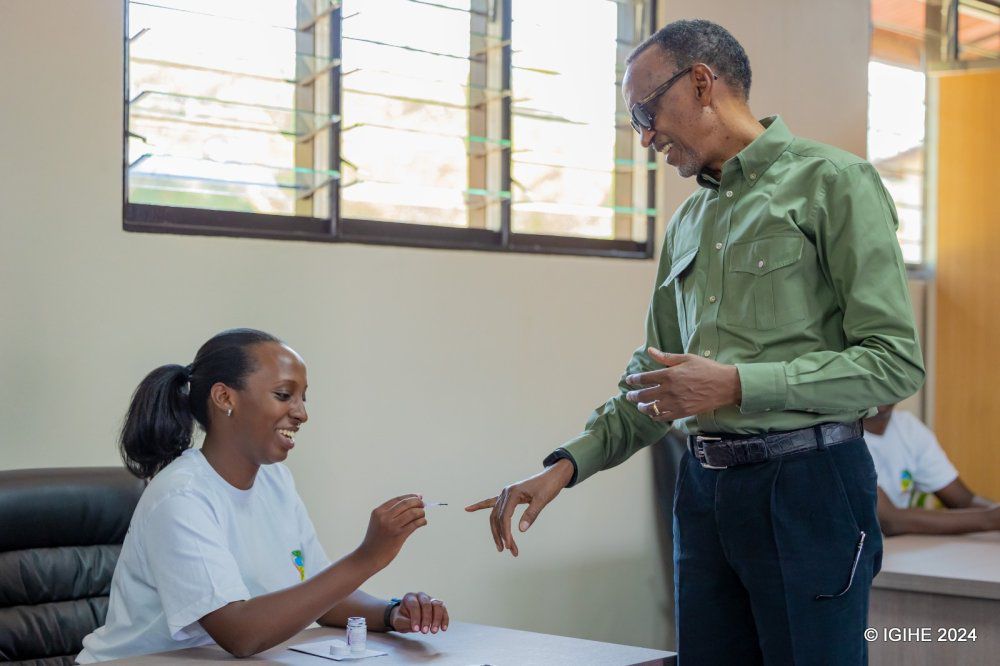Rwanda : elections in a tense border context

From this Sunday until Tuesday, Rwandans inside and outside the country are voting. They are choosing a president, deputies and representatives of specific categories such as women, young people and the disabled in parliament. Various presidential candidates including favorite Paul Kagame have returned to the question of Congolese and Burundian borders where local populations fear imminent attacks.
INFO SOS Médias Burundi
More than 9.5 million Rwandans have registered to participate in these combined presidential and legislative elections, according to the national electoral commission.
Three presidential candidates are in the race, namely the favorite Paul Kagame who is seeking a fourth term as candidate of the ruling RPF-Inkotanyi party, the mild opponent Franck Habineza on behalf of the Democratic Green Party and an independent candidate Philippe Mpayimana.
In their media outings, the first two candidates returned to borders which are either closed, particularly with Burundi in the south, or scrupulously secured in the west with Congo and where populations fear attacks at any time.
“We will continue to ensure your safety and that of your property. We must also ensure that what you were looking for on the other side is available in abundance here. Otherwise, be vigilant and protect yourselves,” Paul Kagame said in Bugesera, a border district with Kirundo, one of the northern provinces of Burundi, during a meeting.
In Rubavu, at the gate of Goma in the DRC, the current Rwandan president did not refuse to raise his accusing finger with his left hand.
“What you hear from the other side shouldn’t scare you. Our valiant sons and daughters are not sleeping, they are on the lookout. If the red line is crossed, you will see what we are talking about. Be reassured and go about your activities without any worry,” he declared in such an electoral meeting.
His gentle challenger Franck Habineza offers solutions if he is elected by miracle.

Franck Habineza is received in a polling station, July 15, 2024: photo credit: New Times
“We must not remain in this eternal cycle and this closed box. I will do everything possible to avoid causes that push us to be in eternal conflict with our neighbors. Borders will no longer be closed, there will be good neighborliness and good relations with the presidents of all neighboring countries,” he promised, in Bugesera in search of the voices of the inhabitants of eastern Rwanda.
On Monday after their respective votes, Kagame and Habineza reiterated their promise to the press.
Paul Kagame expects a landslide victory, counting on “the population who begged me to be elected”.
Franck Habineza hopes to “collect 55% of the votes”.
This is the second time that Paul Kagame is running for office while his country’s borders with Burundi are closed. The last time was in 2017.
Current Burundian President Évariste Ndayishimiye had displayed a certain benevolence and opened borders after his anticipated accession to power following the unexpected death of his predecessor but the honeymoon did not last long.
Just like his predecessor, the late Pierre Nkurunziza, Ndayishimiye accuses his northern neighbor of “supporting, fueling and harboring” putschists and armed groups, in this case the Red-Tabara rebel movement which is on the Burundian government’s list of terrorist movements. The Burundian regime even placed heavy weapons on the borders with Rwanda to “prevent possible danger”.
For Congo, Kinshasa accuses Kigali of “supporting the M23 armed group which controls part of eastern DRC”. Several reports from UN experts have made the same observation.
Paul Kagame washes his hands of it and speaks of « internal problems in these two neighboring countries of Rwanda ».

Rwandans got up very early to choose their president and their representatives in parliament, 15, 2024, Photo credit: New Times
For more than 20 years, the strong man of Kigali has reaped a Stalinist score (more than 90% in each election) in elections strongly criticized by his opponents, the West and America who speak of a « masquerade ».
But for Rwanda, “no one can dictate how the Rwandan democracy should be defined, where choice is free, inspired by the spectacular progress in all areas of the country’s life” since Mr. Kagame’s accession to power.
This table of assets is crowned by the end of the genocide against the Tutsis in July 1994 which claimed more than 1 million victims and the miraculous reconciliation which allowed the executioners and survivors to live together.
And moreover, more than 60% of the population has not known another president because they are under 30 years old. This year, more than 2 million voters were added to the figures of the last election of 2017 according to the electoral commission which specifies that from midnight of Monday, the first trends of the presidential election will be known. The next Rwandan president will be officially announced on the 27th of this month.
More than a thousand observers are following these elections, including more than 300 foreigners.
——-
Paul Kagame receives a mark for having voted, July 15, 2024, photo credit : Igihe

